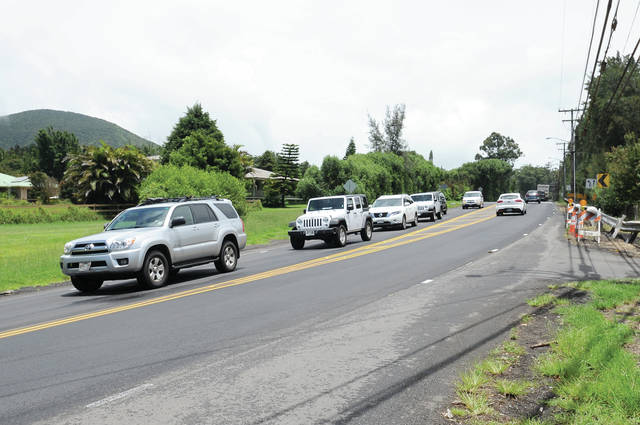KAILUA-KONA — A project to widen 2.8 miles of Mamalahoa Highway in Waimea hit a roadblock Thursday when Hawaii County canceled the bid solicitation after one of the bidders protested the procurement process, claiming it was unfair. ADVERTISING KAILUA-KONA —
KAILUA-KONA — A project to widen 2.8 miles of Mamalahoa Highway in Waimea hit a roadblock Thursday when Hawaii County canceled the bid solicitation after one of the bidders protested the procurement process, claiming it was unfair.
Hawaii County Department of Public Works spokesman Barett Otani said the county will re-bid the project, which will likely push back the project schedule at least a couple of weeks. The county has yet to set a specific bid date.
Once the county awards a bid, the contractor will have 180 days to begin construction. Otani told WHT in late October when the bids were opened that work might begin as early as February. That did not factor in the added time now required because one bidder has filed a protest.
Federal monies will fund most of the highway widening, and federal dollars come with expiration dates, but Otani said the hiccup in the timeline won’t threaten the availability of those funds.
“The money is already set aside, but we want to award and get work going on this project,” he said. “So it’ll happen soon. Real soon.”
The work on Mamalahoa Highway — which will include widening at 18 major intersections, adding left-turn pockets and making drainage improvements between Mana Road and Mud Lane — has been in the county pipeline for years.
The county’s initial cost projections slated the widening at around $25 million. Kiewit Infrastructure West Co., a company based in Omaha, Nebraska, with offices in Honolulu, came in with the lowest bid of $19.11 million. The highest bid was $24.10 million.
Federal monies will fund 80 percent of the project, meaning Kiewit’s now scrapped bid would have saved the county over $1 million based on its projections.
Only one of six bidders filed a complaint, Otani said. That company’s issue with the procurement process was that the county used a three-tier system to structure the bid, which Otani explained is a break from the norm.
“We want to get the best deal for the community and get the most bang for the buck, which is why we put out this package in a tier form,” he explained.
The county segmented the process to include a base bid and then bids on different portions of the desired work to protect against a scenario in which asking for one all-encompassing bid resulted in all six contractors outpricing the project budget.
Otani said it was a mistake on the county’s part, and thus the county is moving to rectify it to ensure fairness. Not doing so could leave the county exposed to a lawsuit.
“It shouldn’t have been put out that way, it should have been put out as just a package bid,” he said. “It was determined by the chief procurement officer that the cancellation would be in the public interest and (rebidding) the package in its full form would be fair to all.”
Otani added Kiewit has a legitimate gripe, as it must rebid against competitors who now know the amount of the company’s initial bid.
However, according to Hawaii Administrative Rules, the county reserves the right to cancel a solicitation for “ambiguous or otherwise inadequate specifications” or if the chief procurement officer deems “a cancellation is in the public interest.”
The county can issue a cancellation following a bid opening as long as it does so before the bid is awarded. A system of checks and balances allows for a certain period of time between an opening and an awarding for challenges such as the one made involving the Mamalahoa Highway widening project.
Kiewit did not respond to a request for comment on the bid cancellation.



